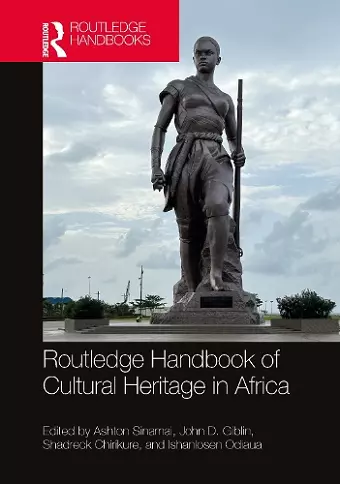Routledge Handbook of Critical African Heritage Studies
Shadreck Chirikure editor Ashton Sinamai editor John D Giblin editor Ishanlosen Odiaua editor
Format:Hardback
Publisher:Taylor & Francis Ltd
Published:6th Sep '24
Currently unavailable, and unfortunately no date known when it will be back

This handbook is a foundational reference point for critical heritage research about Africa and its diaspora.
Foregrounding the diversity of knowledge systems needed to examine heritage issues in such a diverse continent, the contributors to this volume:
- argue for an understanding heritage that is at once both natural and cultural, tangible and intangible, political and dissonant, going beyond the physical and objective to include subjective narratives, performances, rituals, memories and emotions
- examine the pre-coloniality, coloniality, post-coloniality, and decoloniality of current African heritage discourses and their consequences
- analyse how heritage legislation derived from colonial law is compatible or otherwise with how heritage is perceived, identified and remembered in African communities
- discuss questions of repatriation, restitution and reparations in relation to the return of artefacts from Western countries
- illuminate the importance of ‘difficult heritage’ within Africa and its diaspora
- consider the role of heritage for development in Africa
Making a crucial contribution to our understanding of African conceptions and practices of heritage, this book is an important read for scholars of African Studies, heritage and museum studies, archaeology, anthropology and history.
This volume is a tour de force of heritage studies from Africa. It does not shy away from tackling critical issues from difficult heritage to the legacies of colonialism in Africa. The editors and authors have traversed the continent to bring to the fore the multi-layered nature of African heritage and the complexity of managing it. The volume is a timely critique of the use of the past through time and proffers caution on the potential abuse of heritage resources in the present and future. The volume enriches current debates on Africa’s heritage as the continent grapples with its positionality in the global world order. With the current state of conflicts globally, can African heritage contribute to sustainable peace? This volume offers a ray of hope. I recommend it to all beyond students of African studies.
Alinah K. Segobye, Dean of Human Sciences at the Namibia University of Science and Technology and an elected fellow of the African Academy of Sciences.
The book is a very important and welcome addition to the ever-growing literature on topical issues relating to different concerns with Africa’s diverse heritage from various perspectives. Written by leading heritage practitioners and scholars from the continent and abroad, the thirty-five chapters that make up this book cover a wide range of topics and is a must read for instructors, students as well as the lay reader. The different chapters cover a wide range of topics that include the significance attached to cultural objects, sites and monuments, museums, and museology in Africa as well as the legal frameworks for heritage management and the ongoing debates on the decolonisation agenda. This wide coverage is such that the book offers something for everyone interested in Africa’s cultural heritage, its use (and abuse), its management, its role in the present and sustainable management for future generations.
Gilbert Pwiti, Professor of Heritage Studies, School of Humanities, Sol Plaatje University, Kimberley, South Africa
ISBN: 9780367434021
Dimensions: unknown
Weight: 453g
528 pages